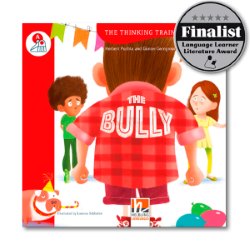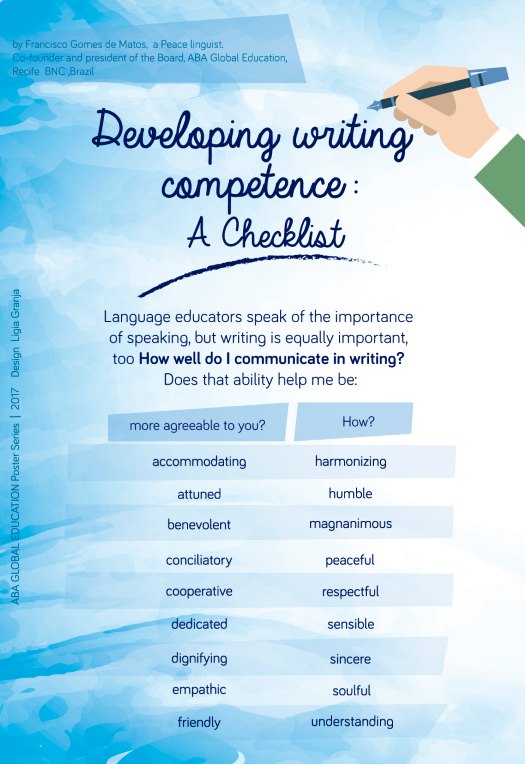Letter 1
We're excited and proud to announce that our young reader from The Thinking Train Series
THE BULLY
written by internationally renowned author team Herbert Puchta & Günter Gerngross and illustrated by Lorenzo Sabbatini, has been nominated as a FINALIST for the Extensive Reading Foundation Language Learner Literature 2017 Award in the Very Young Learners category.
The finalist titles were announced during the Extensive Reading Foundation ceremony at IATEFL 2017 in Glasgow. We take this opportunity to thank everyone who visited the Helbling stand and hope to see you again next year!

Juror’s Comment
"The story is one that all children can relate which is having to deal with the class bully. This graded reader uses lower level vocabulary to tell a compelling tale of how a bully has a change of heart. The story teaches moral lessons such as respect, friendship and kindness. Also, students can have a chance to reflect on their behavior toward others and be aware of the consequences of unkind act. The best quality of this book is the suggestions on how teachers can get students to act out the story, either as TPR activity or as class drama performance. It also provides before reading and after reading activities. The after reading activities are not the usual reading comprehension exercises; they use critical thinking skills and allow students to personalize the language. Illustrations are colorful and beautiful."
Find out more about the book here
Letter 2
Dear Hania,
I’m getting in touch because next month we will be publishing a book that we believe may be of interest to you and readers of Humanistic Language Teaching.
“New Insights into Language Anxiety: Theory, Research and Educational Implications” edited by Christina Gkonou, Mark Daubney and Jean-Marc Dewaele provides an overview of current theory, research and practice in the field of language anxiety and brings together a range of perspectives on this psychological construct in a single volume. More information about the book can be found on our website via the following link:
www.multilingual-matters.com/display.asp?isb=9781783097708
Best wishes,
Florence McClelland
Letter 3
A huge congratulations to Bob Cox!
WINNER
EDUCATIONAL BOOK OF THE YEAR

The Opening Doors to Quality Writing series by Bob Cox!

The Judges' Comments
“Described as two gems which provide innovative approaches to exploring quality texts as stimuli for children’s writing. Judges described The Opening Doors to Quality Writing series as an invaluable resource, particularly for non-specialist teachers. Excellent literary choices contained within very attractively produced books.”
Click here to read the peer testimonials.
Letter 4

Letter 5
Dear Hania Kryszewska,
We are delighted to feature two more of our authors in our Meet our Authors series this month, which allows you to hear from both established scholars and those who are just beginning their academic careers.
This month, our featured author is s are Franka Kermer, who has published her first book with us.
Franka Kermer is a post-doctoral researcher (Kone Foundation, 2017–2021) in English Language and Culture at the University of Eastern Finland. She is particularly interested in the study of cognitive approaches to language structure, second language acquisition and corpus linguistics. Please click here to read her thoughts.
Happy reading!
Christine
Christine von Gall
Deputy Editor
Cambridge Scholars Publishing
christine.von-gall@cambridgescholars.com
Letter 6

- Authors and publishers: Enroll your books at
www.smashwords.com/dashboard/sitewidePromos
- Visit the Smashwords Read an Ebook Week event page at www.smashwords.com/ebookweek where you'll find downloadable images you can share on social media to promote your participation in the event.
- For the story behind Read an Ebook Week, check out my interview with Smashwords author Rita Toews who founded this event 12 years ago, or visit her official event Facebook page
- Every day during the week long sale, celebrate on social media channels (Facebook, Twitter, blog, private mailing lists) that you're participating in the event. Be sure to include a hyperlink to the promotional catalog at www.smashwords.com/books/category/1/newest/1 as well as a direct hyperlink to your book or author page.
- Readers: When you discover a great deal, share it with your friends on social media. Be sure to tag the author (find their Twitter and Facebook addresses on their Smashwords author profile page) so they know you appreciate their participation in the promotion.
- Authors and publishers: If you haven't done so already, complete your Smashwords Interview. This is a great chance for you to connect with current and prospective readers on an entirely new level by sharing the story behind the author! Once you complete your interview, share it on social media.
Here's a quick checklist to help you get the most out of the Read an Ebook Week event:
- Authors and publishers: Enroll your books at
www.smashwords.com/dashboard/sitewidePromos
- Visit the Smashwords Read an Ebook Week event page at www.smashwords.com/ebookweek where you'll find downloadable images you can share on social media to promote your participation in the event.
- For the story behind Read an Ebook Week, check out my interview with Smashwords author Rita Toews who founded this event 12 years ago, or visit her official event Facebook page
- Every day during the week long sale, celebrate on social media channels (Facebook, Twitter, blog, private mailing lists) that you're participating in the event. Be sure to include a hyperlink to the promotional catalog at www.smashwords.com/books/category/1/newest/1 as well as a direct hyperlink to your book or author page.
- Readers: When you discover a great deal, share it with your friends on social media. Be sure to tag the author (find their Twitter and Facebook addresses on their Smashwords author profile page) so they know you appreciate their participation in the promotion.
- Authors and publishers: If you haven't done so already, complete your Smashwords Interview. This is a great chance for you to connect with current and prospective readers on an entirely new level by sharing the story behind the author! Once you complete your interview, share it on social media.
- The official hashtags for the promotion are #Smashwords and #ebookweek17
This promotion is exclusive to the Smashwords store. It will not impact prices at other retailers. Enjoy!
(…) Please bookmark the page at http://bit.ly/SWmerch and tell a friend!
HELPFUL RESOURCES
Mark Coker
Founder
Smashwords
www.smashwords.com
twitter: http://twitter.com/markcoker
blog: http://blog.smashwords.com
Letter 7

Letter 8
Hi,
after reading the Uzbekistan issue carefully <HLT, April 2017, I wrote this tekst on the subject of `Cultural Sensitivity`, which you might like.
Robin Usher
Cultural Sensitivity
Sounding institutional, the word `religious` connects with ritual, or `established` in the sense of `establishment`, whereas `spirit` is a relational attitude corresponding to inner belief, or mental outlook, definable in terms of distrust of, or disregard for, materiality, wherein the individual discerns that which entraps or deceives the mind, so as to involve the body in activities likely to result in decay or degeneration. Religious activities, in the form of ritualized observance of rules and modes of behavior, are designed to ensure the safety of the body and/or mind in relation to what has been called, `the world, the flesh, and the devil` (Bernal, J. D. 1929), that is, religion observes God`s laws as helpful in maintaining the body/mind duality, while the spiritual individual is someone who has accepted that the world of the spirit is a source of aid when encountering the possible pitfalls and entrapments posed by wholeheartedly agreeing to engage with the external physical reality without reflection and unaided by religious ritual or spiritual attitude.
English language teaching poses a dilemma. How to satisfy students` interest in other religious beliefs, while remaining culturally sensitive to the local religion`s hegemony. Defining `spiritual` is more often than not simply a matter of equating it with `good` and steering well clear of descriptions of religious ritual and observance. However, there are some aspects to religion which are non-contentious. Religion presupposes a supreme divinity, called `God` in the West, and `Allah` more often than not in the Middle East, which is about as far as an English language teacher is advisable to go when discussing the differences.
Judeo-Christianity arose in Palestine, through the teachings of the Jewish Messiah, Jesus, and became the New Testament of the Bible, after the history and law of the Jews, that is, the Torah and Talmud, called by Christians the Old Testament of the Bible, which was historically followed by the Koran (610-30 C.E.) of Mohamed`s Moslems in Islam. The Koran is a history and law of the descendants of Ishmael, the second son of Abraham, whose first son, Isaac, founded Judaism, which called God variously; `Jehovah`, `Eloah`, `Yahweh` (there are no written vowels in the Hebrew word, YHWH, so the pronunciation of the tetragrammaton is traditional), etc. `Allah` and `Eloah` are homonyms suggestive of synonymity, although it`s testing the bounds of cultural sensitivity to suggest identity. Textual analysis of the Koran and the Old Testament is revelatory of more similarity than difference, which would be expected if the naming of the supreme deity was equivalent to an understanding of that being`s actual nature.
Traditionally understood as given to him by angels, that is, beings assisting the supreme deity, the Koran of the Prophet Mohamed ibn Abdullah is seen in human terms as legitimizing Ishmael`s birth from a woman not Abraham`s wife, Sara, that is, her maid Hajer, given to Abraham by Sara after the birth of Isaac, her son, because the birth had made her womb barren. Judaism espoused monogamy, while Islam embraced a maximum four-wife polygamy, and although Christianity favors monogamy it accepts Jesus` simple teaching on the nature of promoting peaceful relations: `Love your neighbor as you love yourself.` (Mk: 12. 31). Sometimes erroneously used to mean `religious` in English language teaching and/or usage, because `spiritual` could be applied to Jews, Moslems, and Christians, spirituality isnt related to belief, and believers aren`t religiously identical. Consequently, the word `spiritual` isn`t as contentious as `religion` when communicating with students of different religious backgrounds, so it`s use is more advisable in open discussion, because less likely to provoke accusations of cultural insensitivity.
Jesus was crucified by agents of the Roman Empire of Tiberius and experienced Resurrection and Ascension to heaven, according to what are called the Gospels of the four Evangelist disciples (Matthew, Mark, Luke and John) of the Jewish Messiah, that is, Jesus `Christ`, `the chosen`, which are corroborative narratives of the extraordinary life of the miracle working healer and proselytizer, Jesus, but in the Koran Jesus isn`t crucified, and rather enters into paradise as an Islamic teacher. In Judaism, Jesus` name doesn`t figure at all, and the narrative of the Patriarch Abraham, his son Isaac, and descendant Moses, `the law giver`, who according to the Old Testament received the Ten Commandments of God from a mountain top on tablets of stone during the Jews` exodus from their period of captivity as slaves in Egypt in the reign of Pharaoh Thutmoses III, which are the prohibitions by which Jews live against the taking of life in different ways, figures more highly. Research can provide a more satisfying and culturally acceptable framework for discussion amongst Jews, Moslems, Christians, Hindus, and Buddhists, etc., in which none of them find objections, and that suffices an English language teaching approach posed with the problems of living and entering into new cultures, or welcoming those from other backgrounds with the minimum discomfort affordable to the welcomed and the welcomers in social terms.
References
1 Bernal, J.D. The World, The Flesh And The Devil: An Enquiry into the Future of the Three Enemies of the Rational Soul, 1929.



|